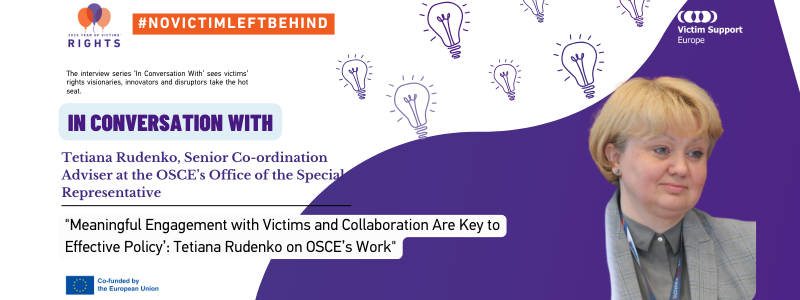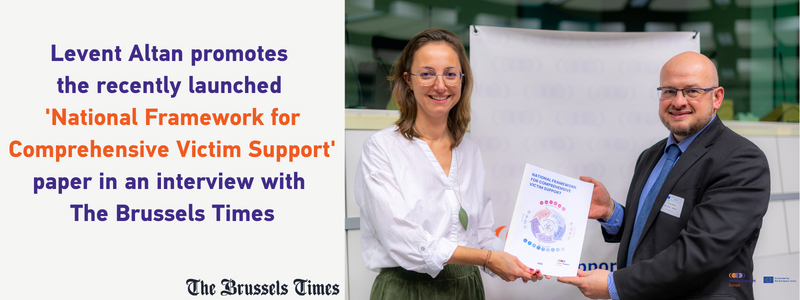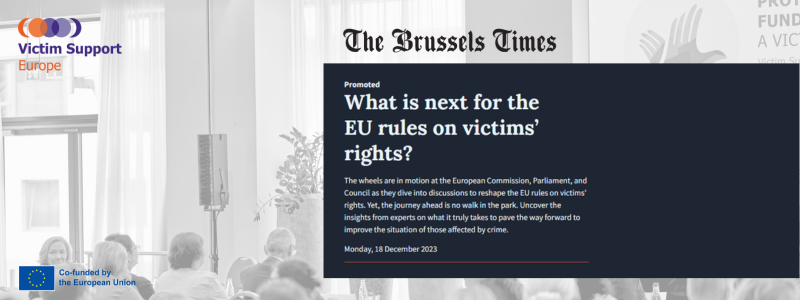”Meaningful Engagement with Victims and Collaboration Are Key to Effective Policy’: Tetiana Rudenko on OSCE’s Work”

Welcome to our exclusive interview with Tetiana Rudenko, Senior Co-ordination Adviser at the OSCE’s Office of the Special Representative and Co-ordinator for Combating Trafficking in Human Beings. This conversation is part of our year-long campaign, “2025: Year of Victims’ Rights,” where we spotlight crucial voices advocating for victims’ rights.
In this interview, Tetiana provides valuable insights into the OSCE‘s role in safeguarding victims, the anticipated changes in the Victims’ Rights Directive, and the importance of international collaboration in ensuring justice and support for all victims. We also reflect on the historical milestones of 2025, marking 40 years since the Declaration of Basic Principles of Justice for Victims of Crime and 25 years since the EU Charter for Fundamental Rights.
Join us as we explore how these anniversaries provide momentum to strengthen victims’ rights across Europe and how the OSCE is contributing to this vital mission.
Role of OSCE in Protecting Victims of Crime
Marina Kazakova, VSE: Thank you for joining us today, Tetiana! Could you explain how the OSCE’s efforts in combating crime intersect with the broader agenda of victims’ rights in Europe? We’d love to hear about specific examples where OSCE’s initiatives have directly impacted the protection and support of victims of crime.
Tetiana Rudenko, OSCE: As the world’s largest regional security organization, the OSCE embraces a comprehensive approach to security that encompasses politico-military, economic and environmental, and human aspects. It addresses a wide range of security-related concerns, including trafficking in human beings.
Trafficking in human beings is a complex and multifaceted crime. The latest available data estimates that human trafficking is among the three largest global criminal markets together with the drug trade and financial crimes. It is estimated that there are about 28 million victims of human trafficking globally. Yet only a bit more than 100,000 victims are identified annually, and only about 15,000 traffickers prosecuted worldwide every year.
The OSCE approach to combating human trafficking includes strong victim protection efforts and support for anti-trafficking systems that put victims at the centre. Insufficient identification mechanisms and protection systems for victims are a major challenge in anti-trafficking efforts in Europe and globally. Less than 1% of all estimated trafficking victims are ever identified worldwide, and too few of those who are identified receive the necessary services and support. To address the issue, the OSCE Office of the Special Representative and Co-ordinator for Combating Trafficking in Human Beings (OSR/CTHB) supports States by conducting research to formulate evidence-based policies, providing expert advice and guidance to inform strategies and enhance legislation, and building the capacity of a broad range of anti-trafficking stakeholders. By way of example, last year, the Office launched a paper on the “social path”[1] to assistance, to help States improve victim identification and protection without conditioning such assistance on victims’ ability or willingness to co-operate with criminal investigations. To help put these guidelines into practice, the Office has conducted 17 workshops in 10 countries to date, and now provides tailored support to States wishing to implement this important “whole of society” approach to victim identification and assistance.
On the Revision of the EU Victims’ Rights Directive
Marina Kazakova, VSE: The upcoming revision of the Victims’ Rights Directive is expected to introduce significant legislative enhancements. From your perspective at OSCE, what are the most critical areas that need to be addressed to better protect victims of crime, and how can these changes be effectively implemented across member states?
Tetiana Rudenko, OSCE: Challenges faced by victims of the crime are numerous and for the victims of human trafficking they are often overwhelming, leading to victims withdrawing from the process, feeling re-traumatized, exposed and abandoned. Issues relating to the engagement of victims with the criminal justice system are complex, including continued reliance on victim testimony on the one hand, and reluctance of victims to co-operate on the other. The reasons for this reluctance include mistrust of authorities and lack of support within the criminal justice process, the need in some jurisdictions to testify on multiple occasions, fear of retaliation against the victim and/or family members, and limited access to restitution and compensation. Similar issues are discussed in the proposal for amending the Victims’ Rights Directive. There are also more specific challenges experienced by victims of human trafficking. They often face a lack of understanding of the vulnerabilities that were abused by traffickers and the trauma caused by their exploitation. The proceedings in human trafficking cases are particularly lengthy, providing strong disincentive to victims coming forward. Foreign victims remain vulnerable to deportation before being able to access justice, services for them are limited and the potential for remedy after leaving the country is quite low. Some victims continue to be prosecuted for criminal acts undertaken as a consequence of being trafficked, with the nature of the relationship with their traffickers not well understood, such as psychological coercion.
It is thus vitally important to ensure that national criminal justice systems apply victim-centred and trauma-informed approaches in the detection, investigation, prosecution and adjudication of human trafficking cases, including application of the non-punishment[2] provision, victim-friendly court procedures and unconditional access to comprehensive assistance and residence permits. Compensation from the State should be available to all victims of trafficking and access to such compensation should be provided irrespective of victim residency status or outcome of a criminal justice process. Furthermore, States should reduce dependence on victim testimony through proactive and robust investigations, and increased use of advanced investigation techniques, including those capitalizing on financial data analysis and availability of new technologies.
Collaboration with International Bodies
Marina Kazakova, VSE: Given OSCE’s role in coordinating efforts across multiple countries, how do you see the collaboration between the OSCE, the EU, and other international bodies evolving, particularly in the context of implementing the revised Victims’ Rights Directive and ensuring that all victims of crime receive adequate support?
Tetiana Rudenko, OSCE: As human trafficking crimes are often transnational, it requires consistent international co-operation, and effective communication between the relevant authorities and institutions within States and between States as well as across the international community. We bring a co-ordinated, consistent approach in advocating for robust victim protections at both the policy level and in assisting States to implement victim-centered and trauma-informed anti-trafficking practices. The OSCE OSR/CTHB is part of ICAT, the Inter-Agency Coordination Group against Trafficking in Persons, where we closely co-operate with other organizations like the UN agencies to merge regional and global agendas. We also partner with the Council of Europe and its Group of Experts on Action against Trafficking in Human Beings (GRETA), on different events and tasks. Additionally, we have bilateral agreements with Interpol and UNODC. As an Office, we facilitate a broad international forum – Alliance against Trafficking in Persons’ Expert Co-ordination Team (AECT) – that includes over 30 key international, non-governmental, and inter-governmental organizations joining forces to prevent and combat human trafficking. It helps develop effective joint strategies and provides OSCE participating States and Partners for Co-operation with innovative and co-ordinated approaches to strengthen their anti-trafficking responses and assistance to victims of this crime. All of the EU Member States are the OSCE participating States, so collaboration with the EU, including the EU Anti-Trafficking Coordinator, is vital to ensure coherent human rights-based approach to assist victims of the crime across the region.
Impact of Legislative and Policy Frameworks on Victims of Crime
Marina Kazakova, VSE: How do you anticipate the legislative reforms and policy frameworks, such as the revised Victims’ Rights Directive and the New Recommendation on Rights, Services, and Support for Victims of Crime, will impact the lives of victims of crime? What additional measures do you believe are necessary to ensure these frameworks translate into tangible improvements for all victims?
Tetiana Rudenko, OSCE: Current developments in the international policy frameworks provide for improvements in access to justice and remedies for victims of crime. Facilitating access to information and advice to victims on their rights prior to their engagement with criminal justice system could help victims make better-informed decisions and enhance their preparedness to interact with respective stakeholders, also contributing to better prosecution outcomes. Providing for individual assessment of the needs and vulnerabilities of victims would lead to tailored, comprehensive trauma-informed assistance to them as well as due consideration of these aspects in prosecution, adjudication, and compensation. Provision of legal aid, especially free legal aid, would help to restore balance in pre-trial investigation and in a court room, particularly in cases where victims are unable to stand for their rights due to psychological and physical abuse suffered at the hands of perpetrators. All these measures as well as specialized training to increase the awareness of judges and prosecutors of the needs of victims would be of paramount importance to avoid secondary traumatization of victims as a result of their participation in criminal proceedings.
Such a “cultural” shift in determining and implementing a victim-centered approach in all stages of criminal justice process would provide a new impetus to enhancing the protection of most vulnerable victims, including victims of human trafficking, and would improve the effectiveness of law enforcement efforts to hold traffickers accountable. While the ultimate responsibility to make and implement the necessary laws and policies and allocate resources rests with the States, the OSR/CTHB will continue to provide expert advice and guidance to OSCE participating States and facilitate sharing of promising practices in this regard.
Reflecting on the Historical Significance of 2025
Marina Kazakova, VSE: As 2025 marks the 40th anniversary of the adoption of the Declaration of Basic Principles of Justice for Victims of Crime and Abuse of Power, and the 25th anniversary of the EU Charter for Fundamental Rights, how do you assess the progress made in advancing victims’ rights since these landmark documents were established? In what ways do these anniversaries provide an opportunity to further strengthen the protection and support for victims of crime across Europe?
Tetiana Rudenko, OSCE: It is indeed encouraging to see the progress achieved since the adoption of the Declaration of Basic Principles of Justice for Victims of Crime and Abuse of Power, and the EU Charter for Fundamental Rights as those documents serve as a backbone for the protection of the rights of victims. While new developments like the revised Victims’ Rights Directive are extremely helpful to revitalize the discussions on the issue and bring victim protection to a whole new level, it is important to continue raising awareness about the broader context, in which these new approaches are able to thrive.
In addition to the 40th anniversary of the adoption of the Declaration of Basic Principles of Justice for Victims of Crime and Abuse of Power, and the 25th anniversary of the EU Charter for Fundamental Rights, 2025 will also mark the 50th anniversary of the Helsinki Final Act. In this core OSCE document, the participating States agreed, among other, to “respect human rights and fundamental freedoms, …for all without distinction as to race, sex, language or religion.” The notion of human rights and fundamental freedoms for all has been further elaborated in numerous OSCE commitments, including about 20 Ministerial Council Decisions on combating trafficking in human beings and protecting its victims. In many senses these commitments help shape the agenda for strengthening the protection and support for victims of crime across the OSCE region. Now it is high time to ensure that the principles and commitments are fully implemented and bring true justices to victims as well as remain vigilant to address new challenges and adopt new approaches.
The European Commission’s 2024−2029 guidelines
Marina Kazakova, VSE: How do you see the OSCE’s work on victims’ rights aligning with the European Commission’s 2024−2029 guidelines, which focus on strengthening societies and safeguarding democracy? Specifically, how can these guidelines be leveraged to enhance the support and protection provided to victims of crime, ensuring their voices are heard and their rights upheld across the EU?
Tetiana Rudenko, OSCE: There are many synergies between the OSCE commitments and approaches outlined in the European Commission’s 2024-2029 guidance in the areas of combating organized crime and ensuring zero tolerance to exploitation of people and impunity of criminals. The OSCE work on designing effective strategies to investigate and prosecute traffickers, including through financial investigations[3], and addressing emerging trends in the field, like technology-facilitated trafficking[4], would help countries to put the guidance’s vision into practice. The aspiration to tackle the skills and labour gaps and ensure the EU labour market is free from exploitation could hardly be implementable without persistent attention to addressing human rights abuses like human trafficking and forced labour within supply chains – another area where the OSCE has been active since 2011[5].
These efforts should be amplified by one crucial element – ethical engagement and integration of the expertise of survivors. When policies and practices are crafted without meaningful engagement of people with lived experience, they risk reflecting stakeholders’ perception of the issue rather than the issue itself. Moreover, they risk to reproduce the actions that ultimately don’t bring about expected outcomes, straining already limited resources. Ultimately, given that human trafficking continues to exist despite all global efforts, we definitely need survivors to tell us where we failed and how we can be more impactful. The OSCE leads by example, including by establishing International Survivors of Trafficking Advisory Council (ISTAC), and encourages other national and international stakeholders to follow it to achieve better impact, bring justice to victims and prevent further crime from happening.
[1] Putting victims first: The ‘social path’ to identification and assistance | OSCE
[2] Policy and legislative recommendations towards the effective implementation of the non-punishment provision with regard to victims of trafficking | OSCE
[3] Following the Money: Compendium of Resources and Step-by-step Guide to Financial Investigations Into Trafficking in Human Beings | OSCE
Recommend0 recommendationsPublished in Opinion




Responses